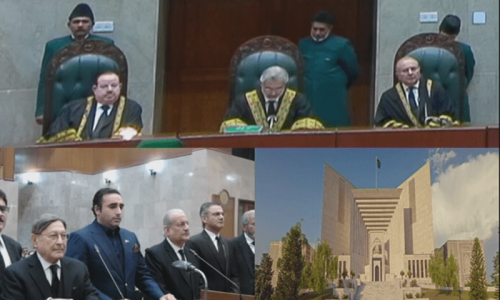Judicial independence’s essence in resisting authoritarian overreach at time it occurs: Justice Shah
Supreme Court’s Justice Mansoor Ali Shah on Tuesday said that the essence of judicial independence was found in “resisting authoritarian overreach” at the time of its occurrence.
The judge’s observation was made in his detailed additional note on the court’s March 6 ruling on the murder trial of former prime minister Zulfikar Ali Bhutto.
The Supreme Court had observed that the trial under the 1979 judgment that sent the PPP founder to the gallows did not meet the requirements of a “fair trial and due process”. Headed by then-chief justice of Pakistan (CJP) Qazi Faez Isa, a nine-judge bench announced its much-anticipated opinion on the long-pending presidential reference to answer whether the Supreme Court could revisit its verdict, which the PPP and jurists regard as historical wrong.
In Tuesday’s additional note, a copy of which is available with Dawn.com, Justice Shah said: “The independence of the judiciary is the cornerstone of justice, and its true test lies in a judge’s ability to stand firm under authoritarian regimes.
“The essence of judicial independence is not found in passivity or retrospective correction but in resisting authoritarian overreach at the time it occurs.”
He called the judiciary a “resilient institution, endowed with the remarkable ability to recover and rise above the shadows of authoritarianism”.
Justice Shah said this resilience was not accidental but rather “deeply rooted in the courage and integrity of those judges who refuse to compromise and have the courage to speak truth to power”.
Judges serving under authoritarian regimes must remember that their true strength lay not in holding office but in steadfastly upholding their independence and principles, the Supreme Court’s senior puisne judge said.
“Judges must act as the first and last line of defence for the rule of law, refusing to compromise even under duress, so that societies do not have to rely on transitional processes to correct the damage inflicted by judicial capitulation,” he said, adding that while transitional justice was important, it should serve as a “sobering reminder” to judges that justice delayed by decades was justice diminished.
“Let the lesson of transitional justice be clear — judges must uphold their oaths with courage in the face of oppression, for only then can the judiciary truly safeguard democracy and the rights of the people.
“Transitional justice, however, often becomes necessary because, during oppressive rule, some judges fail to uphold their constitutional duty, succumbing to the pressure of illegitimate authority. This failure not only enables violations of due process and fair trial rights but also erodes public trust in the judiciary,” he said.
Praising Justice Dorab Patel for his dissent in the Bhutto case and giving up his tenure as the chief justice, Justice Shah said his example showed that that losing a position was a “small sacrifice compared to compromising one’s integrity or leaving behind a legacy of submission or compromise”.
“Judges must always bear in mind that a judge’s valour is measured by his courage to resist external pressures, stand firm against interference and safeguard the independence of the judiciary without fear or favour.”
Justice Shah warned that any delay in confronting authoritarian inroads could “prove fatal” to the rule of law, adding that such incursions must be “resisted and rectified immediately” for the judiciary’s role was to defend justice, not enable its erosion.
“In the annals of judicial history, there are turning points when the judiciary is bold enough to confront its past mistakes and chart a course for a better future. Today marks one such moment — a testament to the judiciary’s unwavering commitment to justice and the rule of law.”
The remarks come against the backdrop of the recently passed 26th Constitutional Amendment that was criticised for the haste with which it was passed.
Some of the major changes made to the Constitution included changing the process of the chief justice of Pakistan’s appointment, taking away the high courts’ suo motu powers, formation of constitutional benches, and performance evaluations of high court judges.
The International Court of Jurists derided the “blow to judicial independence” when the 26th Amendment was signed into law.
Justice Shah was originally set to be the country’s next top judge but changes in the recent amendment led to the position going to Justice Yahya Afridi.
Earlier this month, the Judicial Commission of Pakistan appointed Justice Aminuddin Khan as head of the seven-judge constitutional bench by a majority vote of seven to five, with CJP Afridi among the dissenting members.















































Dear visitor, the comments section is undergoing an overhaul and will return soon.